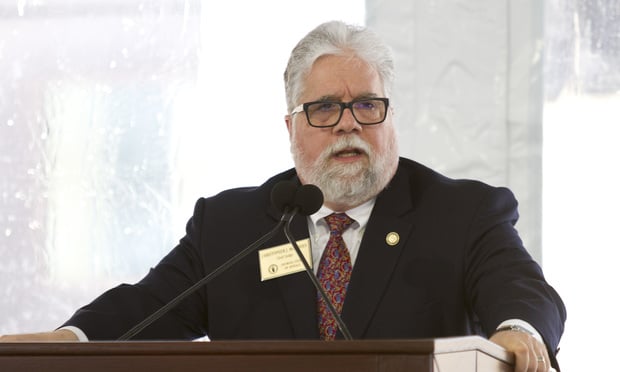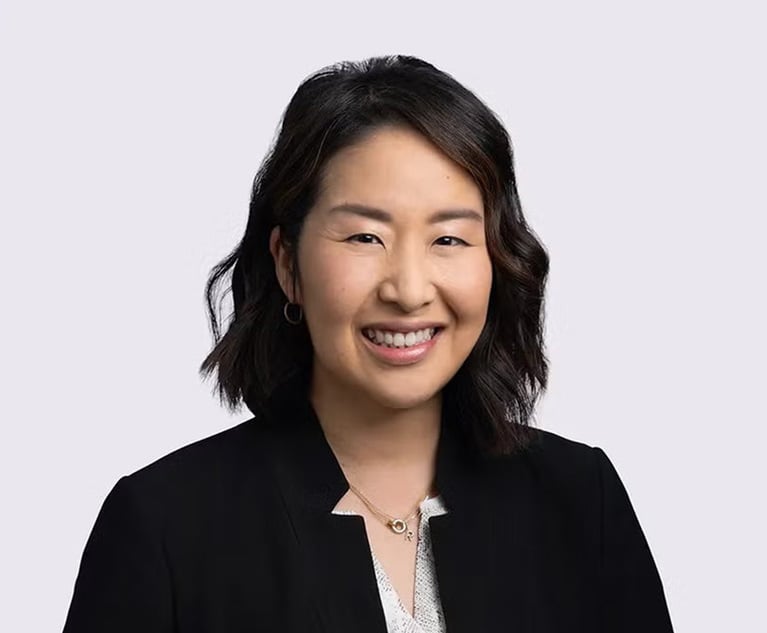Why Appellate Lawyers Are Talking About Court of Appeals Rule Change
"It's a huge deal to us," Brandon Bullard, 2020 chair of the State Bar of Georgia Appellate Practice Law Section, told the Daily Report in an interview. "If you are an appellate practitioner in this state, this is a game changer."
July 20, 2020 at 08:07 PM
5 minute read
 Christopher McFadden, Chief Judge, Georgia Court of Appeals.
Christopher McFadden, Chief Judge, Georgia Court of Appeals.
The Georgia Court of Appeals is about to make a small rule change that appellate lawyers say makes a big difference to them.
The rule is about what constitutes binding precedent. Currently, if one member of a three-judge panel dissents, then the decision affects only the case at hand and not others in the future. The same applies if one member concurs in judgement only without endorsing the reasoning.
That changes Aug. 1 with an updated Rule 33.2 for "judgement as precedent." It will mean that a single dissent in a three-judge panel will no longer remove the decision's value as precedent for future cases, nor will one judge's disagreement with the reasoning.
"This rule change brings the Court of Appeals of Georgia in line with other federal and state intermediate appellate courts throughout the country," Chief Judge Christopher J. McFadden of the Court of Appeals said in a written statement. "It will further our role in building and maintaining a clear and a consistent body of case law throughout the state."
"It's a huge deal to us," Brandon Bullard, 2020 chair of the State Bar of Georgia appellate practice law section, told the Daily Report in an interview. "If you are an appellate practitioner in this state, this is a game changer."
It's also important to all trial judges and even out-of-state lawyers, Bullard said.
"Up to now, 2–1 panel decisions from the Court of Appeals were not binding precedent—regardless of whether the third vote was a dissent, a special concurrence, or a concurrence in judgment only. Any less-than-unanimous panel decision was not the law of the state," Bullard said. "The primary consequence of that arcane Georgia rule was a lack of clarity: Lawyers whose cases involved issues earlier agreed upon by two (but not three) appellate judges could not rely on a certain rule, or even be confident that the issue would be resolved the same way a second time around. Worse still, the Court of Appeals could have resolved the same issue in different ways in different decisions, neither of which would be binding."
The new rule does pose a "trap for the unwary," Bullard said. It's not retroactive. That means 2-1 panel decisions before Aug. 1 remain nonbinding. "Litigants relying on those decisions are still at the peril of the old physical-precedent rule," Bullard said.
Michael Terry of Bondurant Mixson & Elmore said the change in rule 33.2 is "particularly important in Georgia because of our unique 'Two-Term Rule' that imposes a deadline for ruling."
"The prior rule caused many cases to be submitted to additional judges late in the second term, putting the 'stress' into the 'distress period'," Terry said. "The new rule will also assist attorneys in figuring out what is precedential without having to analyze concurrences, partial dissents, etc. to figure out what cases or divisions of cases are binding precedent."
Holland & Knight partner Laurie Webb Daniel said the new rule "reflects the Court of Appeals' effort to be more efficient."
"Previously, if there was a dissent, the case went to an 'en banc' court automatically, usually with seven judges deciding the case. The en banc ruling was binding," Daniel said. "To avoid that cumbersome process, which usually occurred at the end of the term during the 'distress period' when the Court had to deal with the two-term deadline, judges often would concur in judgment only instead of dissenting outright. That meant that the opinion would not be binding precedent but only 'physical precedent.' But physical precedent can be cited as persuasive authority even though it is not binding. And, as a practical matter many opinions that are only 'physical precedent' have been cited by both the Georgia Supreme Court and Georgia Court of Appeals—even in some very significant decisions. The new rule therefore reflects what already was a matter of practice—split decisions could still be influential."
Darren Summerville of the Summerville Firm also took note of the value of split decisions.
"We think the rule change is a marked improvement that brings the Georgia Court of Appeals further in line with basically every other intermediate appellate court. When a court publishes precedential opinions with dissents, it furthers the conversation about the law in a way that advances an appellate court's primary purpose—getting the law right," Summerville said.
"The public and bar benefit from having differing viewpoints carefully explored by our jurists, and having those discussions in precedential opinions maximizes the benefit. When a conflict in the court's jurisprudence arises, it will no longer fall into the shadows as non-precedential," Summerville said.
"That such split opinions will now bind future litigants, and not just the parties, will provide a better platform for obtaining en banc hearing at the Court of Appeals or certiorari to the Georgia Supreme Court. Under that framework, fewer anomalous decisions will escape correction, making the law more consistent—a universal good," Summerville said.
But he noted another advantage of the change, one that may be welcomed by those in disagreement.
"Finally, the new rule reflects an important truth about the ultimate health of the judicial system and rule of law—sometimes the lone voice dissenting in the wilderness is right," Summerville said. "Giving that voice a place in a precedential opinion allows litigants to harness the reasoning to make their points more persuasively and it keeps the door open to changing minds in the ultimate pursuit of getting it right."
This content has been archived. It is available through our partners, LexisNexis® and Bloomberg Law.
To view this content, please continue to their sites.
Not a Lexis Subscriber?
Subscribe Now
Not a Bloomberg Law Subscriber?
Subscribe Now
NOT FOR REPRINT
© 2025 ALM Global, LLC, All Rights Reserved. Request academic re-use from www.copyright.com. All other uses, submit a request to [email protected]. For more information visit Asset & Logo Licensing.
You Might Like
View All
12-Partner Team 'Surprises' Atlanta Firm’s Leaders With Exit to Launch New Reed Smith Office
4 minute read
After Breakaway From FisherBroyles, Pierson Ferdinand Bills $75M in First Year
5 minute read
On the Move: Freeman Mathis & Gary Adds Florida Partners, Employment Pro Joins Jackson Lewis
6 minute readLaw Firms Mentioned
Trending Stories
- 1Paul Hastings, Recruiting From Davis Polk, Continues Finance Practice Build
- 2Chancery: Common Stock Worthless in 'Jacobson v. Akademos' and Transaction Was Entirely Fair
- 3'We Neither Like Nor Dislike the Fifth Circuit'
- 4Local Boutique Expands Significantly, Hiring Litigator Who Won $63M Verdict Against City of Miami Commissioner
- 5Senior Associates' Billing Rates See The Biggest Jump
Who Got The Work
J. Brugh Lower of Gibbons has entered an appearance for industrial equipment supplier Devco Corporation in a pending trademark infringement lawsuit. The suit, accusing the defendant of selling knock-off Graco products, was filed Dec. 18 in New Jersey District Court by Rivkin Radler on behalf of Graco Inc. and Graco Minnesota. The case, assigned to U.S. District Judge Zahid N. Quraishi, is 3:24-cv-11294, Graco Inc. et al v. Devco Corporation.
Who Got The Work
Rebecca Maller-Stein and Kent A. Yalowitz of Arnold & Porter Kaye Scholer have entered their appearances for Hanaco Venture Capital and its executives, Lior Prosor and David Frankel, in a pending securities lawsuit. The action, filed on Dec. 24 in New York Southern District Court by Zell, Aron & Co. on behalf of Goldeneye Advisors, accuses the defendants of negligently and fraudulently managing the plaintiff's $1 million investment. The case, assigned to U.S. District Judge Vernon S. Broderick, is 1:24-cv-09918, Goldeneye Advisors, LLC v. Hanaco Venture Capital, Ltd. et al.
Who Got The Work
Attorneys from A&O Shearman has stepped in as defense counsel for Toronto-Dominion Bank and other defendants in a pending securities class action. The suit, filed Dec. 11 in New York Southern District Court by Bleichmar Fonti & Auld, accuses the defendants of concealing the bank's 'pervasive' deficiencies in regards to its compliance with the Bank Secrecy Act and the quality of its anti-money laundering controls. The case, assigned to U.S. District Judge Arun Subramanian, is 1:24-cv-09445, Gonzalez v. The Toronto-Dominion Bank et al.
Who Got The Work
Crown Castle International, a Pennsylvania company providing shared communications infrastructure, has turned to Luke D. Wolf of Gordon Rees Scully Mansukhani to fend off a pending breach-of-contract lawsuit. The court action, filed Nov. 25 in Michigan Eastern District Court by Hooper Hathaway PC on behalf of The Town Residences LLC, accuses Crown Castle of failing to transfer approximately $30,000 in utility payments from T-Mobile in breach of a roof-top lease and assignment agreement. The case, assigned to U.S. District Judge Susan K. Declercq, is 2:24-cv-13131, The Town Residences LLC v. T-Mobile US, Inc. et al.
Who Got The Work
Wilfred P. Coronato and Daniel M. Schwartz of McCarter & English have stepped in as defense counsel to Electrolux Home Products Inc. in a pending product liability lawsuit. The court action, filed Nov. 26 in New York Eastern District Court by Poulos Lopiccolo PC and Nagel Rice LLP on behalf of David Stern, alleges that the defendant's refrigerators’ drawers and shelving repeatedly break and fall apart within months after purchase. The case, assigned to U.S. District Judge Joan M. Azrack, is 2:24-cv-08204, Stern v. Electrolux Home Products, Inc.
Featured Firms
Law Offices of Gary Martin Hays & Associates, P.C.
(470) 294-1674
Law Offices of Mark E. Salomone
(857) 444-6468
Smith & Hassler
(713) 739-1250







